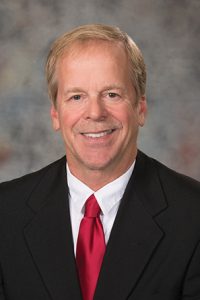Vacant property registration proposed
A bill intended to address the problem of vacant properties was considered Jan. 31 by the Urban Affairs Committee.

Albion Sen. Tom Briese, sponsor of LB256, said the bill would provide communities an additional tool to address problem properties and housing shortages. Existing nuisance ordinances have limited application for vacant properties, he said, which can hinder economic growth and are a concern for many small communities.
“The purpose of LB256 is to promote the health, safety and welfare of Nebraska by giving communities statutory authority to enact vacant property registration ordinances,” Briese said.
Under the bill, a municipality could adopt an ordinance that would allow it to identify and register vacant properties, collect fees to compensate for the public costs of property vacancy, plan for rehabilitation and encourage occupancy of vacant properties. The registry could apply to commercial or residential property.
If adopted, a vacant property registration ordinance would require registration of a property vacant for 180 days or longer. An initial registration fee of no more than $250 for a residential property and $1,000 for a commercial property would be assessed. Supplemental fees would be allowed and exemptions to the fee requirement could be provided.
Unpaid registration fees and fines would become a lien on the applicable property upon notice to the county.
Briese said he would be offering an amendment to exempt primary and metropolitan class cities from the bill’s provisions to accommodate stakeholder’s concerns.
Greg Ptacek, economic development director for the city of Neligh, testified in support of the bill. Approximately 10 percent of Neligh’s housing stock currently sits vacant, he said, which creates a housing crunch in the small community. The fees and fines associated with a vacant property ordinance could provide a necessary financial incentive to property owners in Neligh and other municipalities across the state, he said.
“If we were to take 5 percent of those houses and put them back on the market … we would have about 4,000 [more] homes in Nebraska,” Ptacek said.
Lynn Rex of the League of Nebraska Municipalities also testified in support of the bill and the proposed amendment. As amended, she said, the bill would exempt Lincoln and Omaha, which already have programs in place to address vacant properties.
In addition, she said, the bill would — without creating a mandate — give small and medium-sized communities more ways to encourage owners of problem properties to cooperate with city government and find solutions.
“Financial pressure does work when you’re trying to deal with vacant properties,” Rex said.
Ward Hoppe, testifying on behalf of the Nebraska Realtors Association, opposed the bill, which he said is unnecessary and goes too far. LB256 would not address affordable housing concerns, he said, but instead would create a fining system that likely would lead to the confiscation of property.
In addition, he said, the bill does not require exemptions for property that is used sporadically, such as for hunting seasons.
“The issues that are raised by the definitions of vacant property within the bill are all issues that can be dealt with by municipalities under the existing structure of nuisance laws and authority,” he said.
The committee took no immediate action on the bill.


